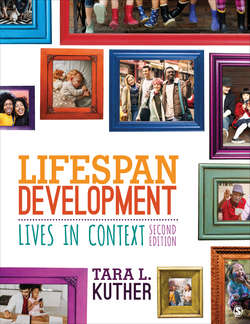Читать книгу Lifespan Development - Tara L. Kuther - Страница 395
На сайте Литреса книга снята с продажи.
Cultural Influences on Development Culture and Theory of Mind
ОглавлениеAs children develop, they show improvements in theory of mind and get better at taking other people’s perspectives and communicating with them. Cultural differences in social norms might influence children’s emerging understanding of the mind. Collectivist cultures emphasize the community, whereas individualist cultures focus on the needs of the individual. These differing perspectives may influence how children come to understand mental states as well as their ability to take their perspectives (Taumoepeau, 2015). For example, children from Japan tend to show delayed development on false-belief tasks compared with Western children (Wellman, Cross, & Watson, 2001). When researchers probed children’s understanding of the false-belief task by asking them to explain why the actor searched in the wrong location for his chocolate, Japanese children failed to use thoughts as explanations. Instead of giving explanations associated with mental states, such as, “He didn’t know it was moved,” Japanese children provided justifications that referenced the physical situation (e.g., “The chocolate is now in a different place”) or interpersonal factors (e.g., “He promised to do so”). The findings suggest a cultural difference in mind reading, whereby Japanese children who are raised with collectivist values focus less on an actor’s mental states and more on his physical and social situation when answering questions about his behavior.
Culture shapes children’s thinking. A study of 8-year-old children from Peru used a culturally appropriate version of the Band-Aid box task in which a sugar bowl contained tiny potatoes (Vinden, 1996). At first the children believed the bowl contained sugar. After learning that it contained potatoes, they answered typical false-belief questions incorrectly, predicting that others would respond that the bowl contained potatoes. Even at age 8, well after Western children succeed on similar tasks, the Peruvian children responded incorrectly, unable to explain why others might initially believe that the bowl contained sugar and be surprised to learn otherwise. One explanation is that the children in this study were raised in an isolated farming village where farmers worked from dawn to dusk and there was no reason or time for deception (Vinden, 1996). The Peruvian children’s culture did not include ideas such as false belief, or deceiving others, as their day-to-day world was concerned more with tangible activities and things rather than considerations of people’s thoughts.
Other research with Samoan and Vanuatu children of the South Pacific has confirmed the relevance of culture on theory of mind. Samoan children ages 3 to 14 years showed delayed development in theory of mind and a prolonged transition to succeeding on theory of mind tasks relative to Western samples (Dixson, Komugabe-Dixson, Dixson, & Low, 2018; Mayer & Träuble, 2015). Samoan and Vanuatu children’s slow progression on theory of mind tasks is consistent with the Pacific Island doctrine of opacity of mind (Slaughter & Perez-Zapata, 2014). Samoan and Vanuatu cultures deemphasize internal mental states as explanations for behavior. Samoan and Vanuatu children, therefore, are not exposed to discussions about the mind. They get little experience considering other people’s thoughts. Research with English-speaking Western samples has shown that conversations about people’s thoughts predict children’s understanding of false beliefs (Slaughter, Peterson, & Mackintosh, 2007). Therefore, Samoan and Vanuatu children’s delayed success on false-belief tasks is likely a result of their culture’s views. In support of this idea is a study of Pacific families living in New Zealand, in which mothers with a stronger Pacific cultural identity referred to beliefs less often when talking to their children than mothers whose Pacific identities were weaker (Slaughter & Perez-Zapata, 2014; Taumoepeau, 2015). Samoan and Vanuatu children may be relatively slow to attribute false beliefs because they take longer to recognize that such beliefs exist relative to cultures where minds are less opaque. Interestingly, however, Vanuatu children’s performance varied by context. Vanuatu children who lived in towns showed more advanced performance than those who lived in rural settings, suggesting that the social contexts within a given cultural setting also influence how children come to understand the nature of people’s thoughts (Dixson et al., 2018).
